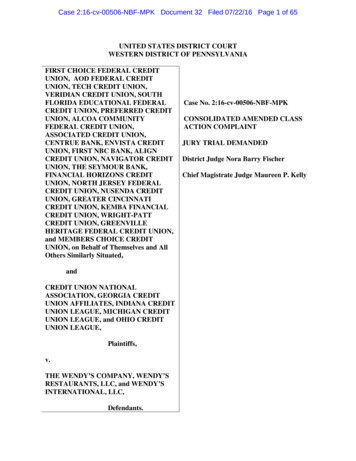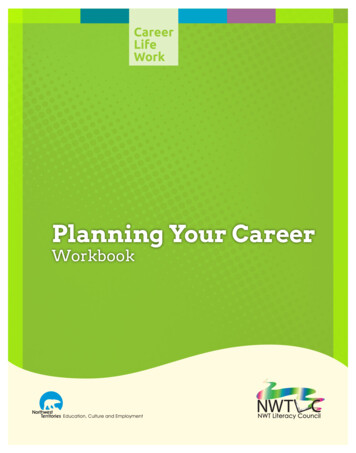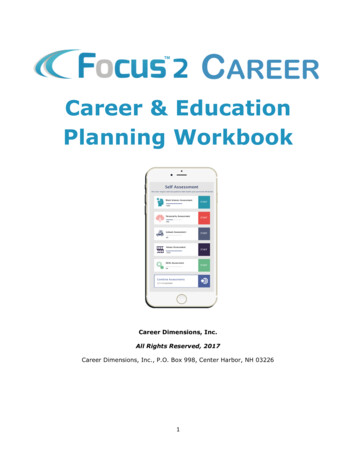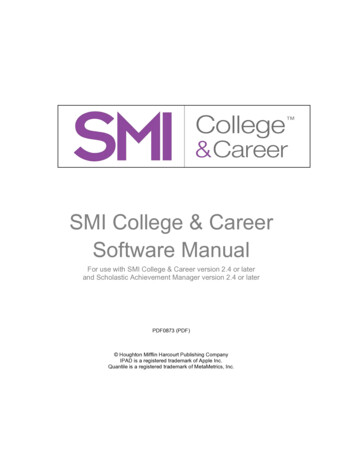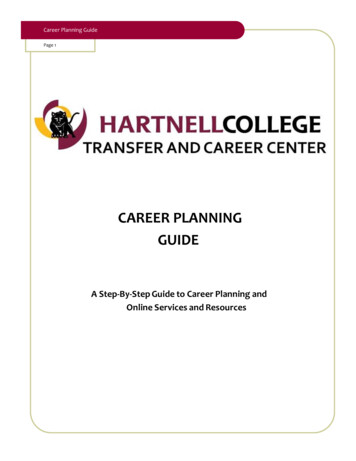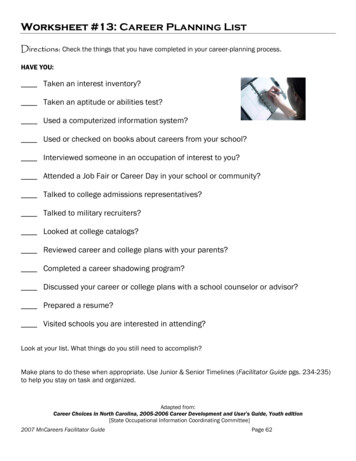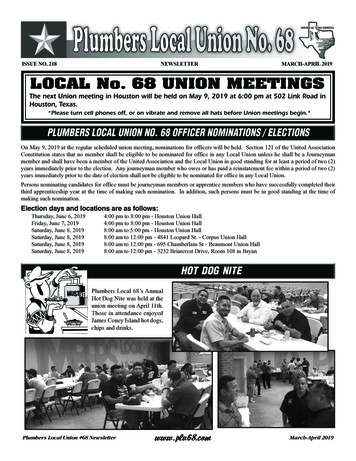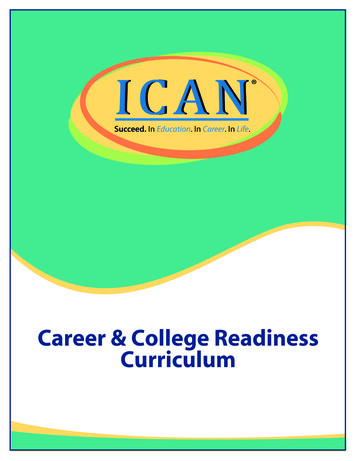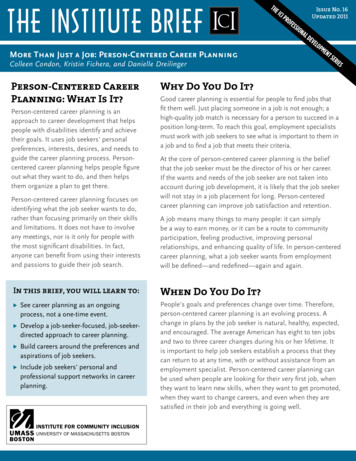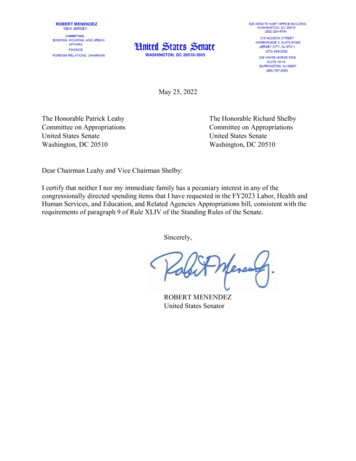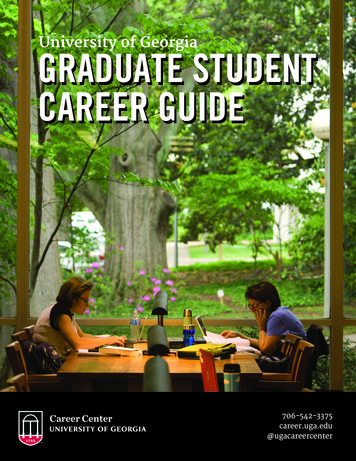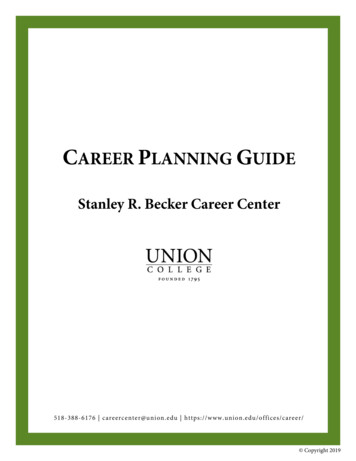
Transcription
CAREER PLANNING GUIDEStanley R. Becker Career Center518-388-6176 careercenter@union.edu https://www.union.edu/offices /career/ Copyright 2019
Career Planning ModelKnowYourselfPursueYourPassionDecide &Give it100%ExploreOptions
Career PlanningCareer planning is a lifelong process. The three phases of this process – know yourself, explore options,and decide and go for it – will be repeated many times in your lifetime. By effectively engaging in eachphase you will discover fulfilling career options that evoke your passions. This guide is intended to giveyou an overview of the Career Planning Process so you can manage your career for a lifetime in adynamic, diverse, and global environment.Career Planning ProcessOn page one, you’ll find a visual representation of the Career Planning Process which will help youpursue your passion. By this, we mean pursuing opportunities you’re genuinely interested in, show anatural curiosity about, and you are self-motivated to advance your knowledge and/or skills in this area.We believe that if you’re genuinely interested in your work, your natural curiosity will cause you to ask thetougher questions, your motivation will help you find the answers to these questions, and the resultingrewards, both intrinsic and extrinsic, will take of themselves. Pursue Your Passion is in the center of themodel to illustrate the intended goal of the Career Planning Process.Effective career planning starts with knowing yourself. Having a strong awareness of your interests,skills, abilities, and values will assist you in making career decisions consistent with who you are, therebyincreasing your likelihood of success, however you define it. The next phase is to explore options. Bylearning more about options, you’ll be better prepared to assess and make career decisions that align withyour sense of self. After you know yourself and have explored options, the next phase is to decide and gofor it. To successfully navigate each phase of the Career Planning Process you will need to reflect, think,plan, and execute your plan.Making a decision to work in a particular career field is a decision that you are likely to make many times.In fact, according to the Bureau of Labor Statistics the average working person changes jobs 10-14 times.Make your decision and as long as you’re passionate about what you’re doing, keep doing it. If youdiscover that you are no longer passionate about what you’re doing, take what you have learned andrevisit the Career Planning Process.2
Career Planning PhasesPhase I – Know YourselfFulfilling career options start with learning who you are and making decisions consistent with yourinterests, skills, abilities, and values. Becoming more self-aware, or knowing yourself, means reflecting onyour past experiences and using the information you’ve learned to help guide future decisions. As youcontinue to build upon your experiences your sense of self will evolve, thus allowing you to makeintentional career decisions aligned with who you are throughout your life.Reflect & Think What are some of your favorite courses? What, specifically, do you like about them?What activities do you find interesting, motivating, and enjoyable (e.g., sports, clubs, reading,community service, etc.)?What unique skills, abilities, and characteristics do you possess? What do others say are yourunique skills, abilities, and characteristics?What do you value most when considering potential career options (e.g., using creativity, helpingothers, leading others, financial rewards, etc.)?What did you like and dislike most about past work and volunteer experiences?Plan & Execute Make an appointment with a Career Advisor to discuss career fields consistent with your interests,personality, and skill sets, and consider taking a self assessment.Research courses and majors of interest in the Union College course catalog, speak with yourAcademic Advisor and other faculty about potential classes, and enroll in classes of interest.Speak with faculty about research projects and terms abroad in academic areas of interest.Attend Club Expo and connect with Student Activities to identify clubs and organizations ofinterest and get involved.Participate in volunteer opportunities. Volunteering is a great way to facilitate your awareness ofyour relevant skills and abilities while building marketable experiences.Have the courage to get out of your comfort zone. This will help you get to know yourself better.Recommended Resources Career assessments (available by appointment in Becker Career Center)Academic advisors and faculty members in potential majors, Union academic areas of study websiteStudent clubs and activitiesInternational Advising Office, Diversity and Inclusion Office, Academic Achievement OfficeMulticultural Affairs, Religious and Spiritual Life, Disability Services OfficeKenney Community Center3
Phase II – Explore OptionsOnce you have a clear sense of self, the next step in effective career planning is exploring options thatutilize your interests, skills, abilities, and values. Gather information about potential options, assess if orhow these options align with your sense of self, and use that information to make decisions.Reflect & Think What information do you need to get about career fields of interest to make informed decisions?What career fields align with your interests?Given your skills and abilities, in what jobs or internship settings would these be applicable?Plan & Execute Research career fields of interest using resources including Facts on File, Vault, GoinGlobal,Candid Career, What Can I Do With a Major in, and the Becker Career Center library. Note jobduties, required training and education, and necessary skills and abilities on the worksheet, foundon page six.Identify Union alumni in career fields of interest via the Union Career Advisory Network (UCAN)and LinkedIn to conduct informational interviews to learn more about potential career options.Speak with family members, professors, friends’ parents, and personal contacts in career fields ofinterest to find out about potential internship and shadowing experiences.Check Handshake and other search resources on Becker’s webpage to find potential internship andjob opportunities, and for upcoming events to attend (e.g., Career Fair, Employer InformationSessions, Workshops, etc.).Attend Union sponsored events such as guest speakers, alumni events, and Minerva programs tonetwork and learn more about career fields of interest.Recommended Resources Becker Career Center Career Exploration Resources including Facts on File, Vault, GoinGlobal,Candid Career, and What Can I Do With a Major In, all available on Becker’s webpageNetworking GuideUnion Career Advisory Network (UCAN) – Attend UCAN Orientation to gain access.HandshakeCampus Events CalendarProfessional associations related to career field of interest (i.e. American Historical Association;Society of Neuroscience, American Psychological Association)4
Phase III – Decide & Go for ItOnce you have identified a career field that aligns with your interests and abilities, the next step is todecide and go for it. During this phase, a specific goal is set (e.g., getting an internship in public relations)and a plan for achieving it is developed and executed. Once you have secured an opportunity in yourcareer field of interest, use the information gained from your experience to remain in the career field orstart the career planning process over again.Reflect & Think What are the action steps you need to take to secure an opportunity in your career field of interest?With whom can you speak to get information about internships in this field?What career field should you focus on for internships? Are there other opportunities you shouldbe open to? If so, what are they?What experiences from your academic, extracurricular, and employment background qualify youfor these career fields? How can you highlight their relevancy in your resume, cover letter, andinterview?How will these opportunities assist you in your long-term career goals?Who can you ask to serve as a professional reference?Plan & Execute Update your resume and have it reviewed by a Career Advisor.Meet with a Career Advisor to establish your job/internship search strategy.Check Handshake and other search resources on Becker’s webpage to find potential internships.Attend Career Fairs, speak to employers regarding potential job/internship opportunities, provideyour resume to employers of interest, and send thank you e-mails.Identify Union alumni in career fields of interest via the Union Career Advisory Network (UCAN)and LinkedIn to conduct informational interviews to learn more about potential career options.Write a cover letter for a specific opportunity on Handshake using the Cover Letter Writing Guideand have it reviewed by a Career Advisor.Meet with a Career Advisor to prepare for interviews and develop effective interviewing skills.Select three to five people as references including faculty, supervisors, coaches, and/or collegeadministrators who have knowledge of your abilities and goals.Recommended Resources Handshake and other job/internship search databasesResume Writing GuideCover Letter Writing GuideNetworking GuideInterviewing Guide5
Career Exploration WorksheetNetworking with professionals and utilizing Career Center research tools (e.g., Facts on File, GoinGlobal,Vault, Candid Career, What Can I Do With This Major, and the Becker Career Center library) areeffective methods to learn about career fields and occupations of interest. Use this sheet to collectpertinent data on one potential field or occupation. As you collect information on the different aspects ofthe field or occupation, reflect and think about how they align with your sense of self.Career Field or OccupationPrimary Job ResponsibilitiesTraining, Education and Experience RequiredKey Skills, Abilities, and Personality TraitsPotential Work Environments (organization size(s), expected # hrs/wk, travel expectations, etc.)Advancement Opportunities (Career Ladder)Salary ExpectationsProjected Demand for this Occupation over the Next 5 YearsProfessional Organizations (for Further Research and Opportunities)6
Career Planning . Career planning is a lifelong process. The three phases of this process - know yourself, explore options, and decide and go for it - will be repeated many times in your lifetime. By effectively engaging in each phase you will discover fulfilling career options that evoke your passions. This guide is intended to give
